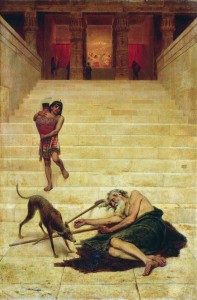Leviticus 19:1-2, 9-18
This text is used for the Lectionary Year A on February 19th, 2017.
 If a preacher were to say to a congregation, “Please turn to Leviticus,” I wonder if the congregation would say something like, “Who is Leviticus?” Or might they think, “Did he say, Spartacus?”
If a preacher were to say to a congregation, “Please turn to Leviticus,” I wonder if the congregation would say something like, “Who is Leviticus?” Or might they think, “Did he say, Spartacus?”
Hearing the word “Leviticus” in today’s church might be as foreign as hearing the name of “Spartacus,” the Thracian gladiator, in the church. Indeed, some preachers might feel one must be a gladiator to prepare a sermon from Leviticus.
The preacher might want to start her sermon on Leviticus 19:1-2, 9-18 by dealing with the book of Leviticus and its regular neglect by many preachers. She may want to address the thought of some that this biblical book is not relevant today and perhaps not easily understood and even boring. One might have the view that today’s world has nothing to do with sacrificial rituals and regulations as emphasized by Leviticus. By contrast, there may be those who see the person and work of Christ in the book as they interpret it through allegory. Notably, the preacher must be resolved on her view of the book before preaching the text.

